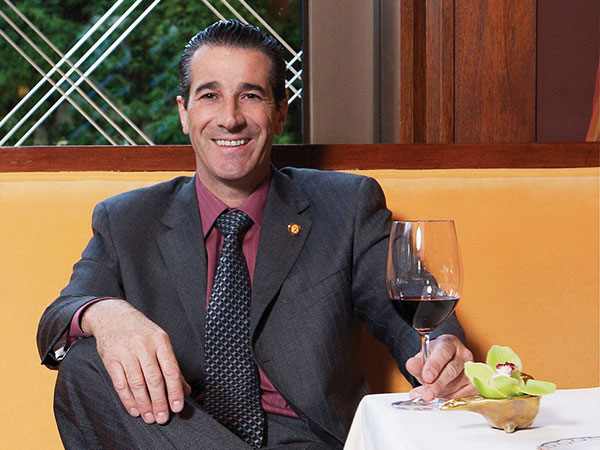Master sommelier pours talents into winemaking in Los Olivos
IN THIS ARTICLE
- Columns Topic
- Tom Bronzini Author
By Tom Bronzini Friday, February 17th, 2017

Master sommelier Paolo Barbieri is the winemaker and owner of Barbieri Wine Co. in Los Olivos.
Anyone who has seen the 2012 movie “Somm” can appreciate how incredibly difficult it is to earn the badge of master sommelier.
The documentary follows four candidates among more than 50 studying with near-fanatical devotion for the supremely challenging, three-part exam to become members of the Court of Master Sommeliers. Only six passed.
That’s a typical result for the annual test. The four young men studied six to 10 hours a day, filled thousands of index cards with information about wine varietals and regions, and held blind tastings to sharpen their skills.
The most daunting part of the exam was when each candidate sat down before six glasses of wine — three whites and three reds. They had 25 minutes to identify all six by wine varietal, country of origin, region or appellation and vintage. Points were awarded for how accurately they appraised specific properties, among them color, clarity, brightness, fragrance, taste, acidity, alcohol level, balance and complexity.
They were never told what the wines were. If they earned 75 points or more, they passed the blind tasting. To become master sommeliers, they also had to survive the theory test and the service section, performing tasks and answering questions in a mock restaurant setting. Those failing any parts had two years to pass them at annual exams or they would have to start all over again.
Master sommelier Paolo Barbieri, winemaker and owner of Barbieri Wine Co. in Los Olivos, told me at his tasting room that his experiences were very much like those in the documentary.
“The only way to pass the test is you have to be an obsessive person,” he said. Barbieri, who became a master somm in 2003, saw men in tears when they did not pass all parts of the exam within three years and had to reset.
Barbieri studied for the advanced and master exams while he was a sommelier at the Bellagio in Las Vegas. He says it helped to be working in one of the top cities for master sommeliers, with high-end restaurants opening at luxury resorts.
He was mentored by master sommelier Jay James, studied with strong candidates who went on to earn their badges and had the support of Southern Wine & Spirits in providing world-class wines for tasting.
Barbieri has run restaurant wine programs in San Francisco and at the Bellagio, Cosmopolitan and Wynn in Las Vegas. He dabbled in winemaking beginning in 2003, a journey that led him to leave a high-flying career in Vegas for the unknowns of a wine business in Santa Barbara County.
He made his first barrel of wine as a fun project at his home in Las Vegas, then two barrels in 2004.
He started Barbieri Wine Co. in 2005 with the help of Santa Barbara County vintner Joey Tensley, who offered use of his winery in Buellton.
Barbieri made 300 cases and sold the wine in Las Vegas as a sideline. He boosted production of his Rhone wines slowly while working as a sommelier. “I saw the winemaking as another facet of what I’m doing,” he said.
Gradually, Barbieri and his wife, Erin Kempe, felt they wanted a different career path and lifestyle. In 2014, they quit their jobs in wine and culinary service and moved to Santa Barbara County to become full-time vintners.
“It was hard. It’s definitely a leap of faith because you don’t know who’s going to come through the door and buy wine,” Barbieri said.
They opened a tasting room in Los Olivos offering Barbieri wines focused on Rhones (syrah, grenache) and Kempe wines featuring pinot noir and other varietals. Their winery is in Buellton, where they expect to produce about 2,500 cases this year.
I asked Barbieri how his background as a master sommelier informs the winemaking. He said it gives him a reference point on where the wine is in quality and where it can be improved.
“My advantage is that I was fortunate enough to taste some of the greatest wines in the world,” he said. “. . . It’s good and it’s bad at the same time because then you become your worst critic.”
Barbieri, having studied and tasted wines from all over the world, said he thinks it’s wrong to compare viticultural areas because each has its own identity.
“We might have some flavor that reminds us of some areas but there is always a difference, in my opinion,” he said.
Barbieri has noticed a growing recognition of Santa Barbara County wines.
“I think we are excelling in certain things, we are good in some other things but I think we can get a lot better,” he said, noting that the vines are relatively young and knowledge of the vineyards is growing.
“The beauty is that I think we have great weather here, great vineyards. We can produce world class wine like other areas of the world.”
• Contact Tom Bronzini at tbronzini@[email protected].











